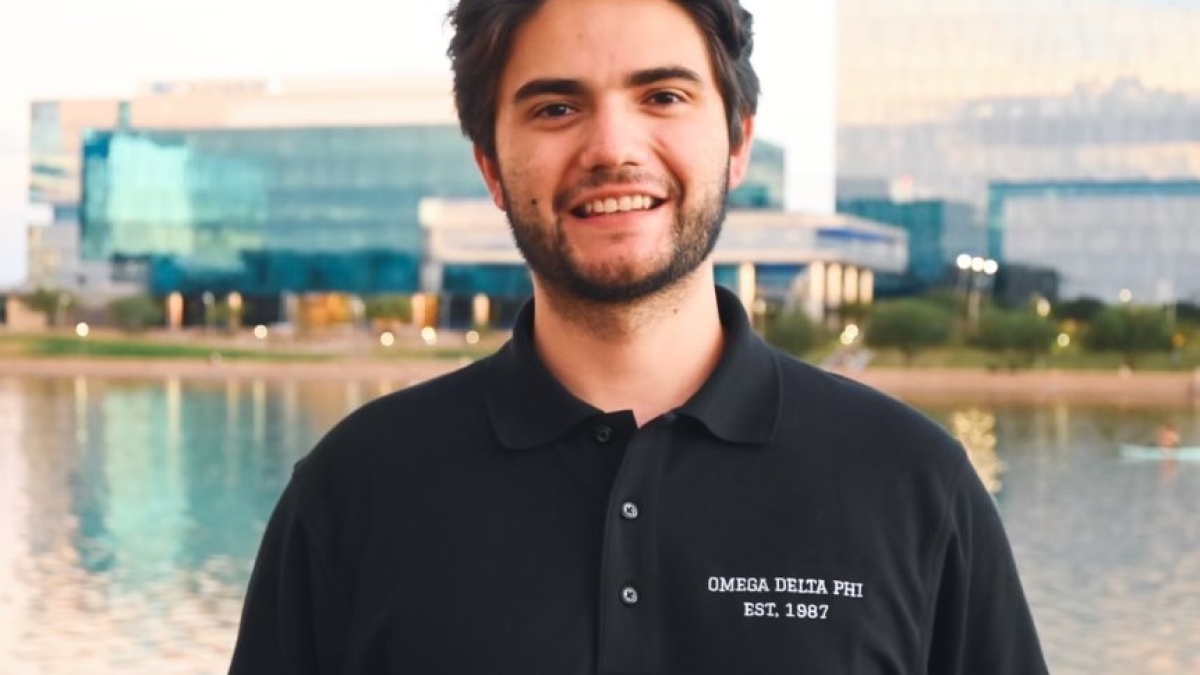First-generation College of Health Solutions graduate values giving back

Angel Jose Sanchez is graduating with his Bachelor of Science in public health from the College of Health Solutions.
Editor’s note: This story is part of a series of profiles of notable spring 2023 graduates.
It can be difficult for a first-generation college student to fully understand just what that status means.
That was the case for College of Health Solutions graduate Angel Jose Sanchez. He learned to appreciate its importance while pursuing his Bachelor of Science in public health.
“When I was in high school, I didn't really get what being a first-generation student means,” Sanchez said. “I figured out that first-gen students have their own unique challenges pretty quickly though, and it changed my perspective entirely.”
While he may not have fully grasped what he was getting into, he worked hard in high school to put himself in a position to succeed. He qualified for the President Barack Obama and New American University scholars programs.
Since enrolling at ASU, he has sought out opportunities to help other students from similar backgrounds, including working as a student success coach on the Downtown Phoenix campus and interning with the Helping Hands program at Native Health.
“I no longer see first-generation as a (negative) label, and I'm proud to be graduating as a first-gen student,” Sanchez said.
Question: What was your "aha" moment when you realized you wanted to study the field you majored in?
Answer: I didn't really have an "aha" moment at any point. I had no idea what I wanted to do when I came to ASU. Thankfully, as I progressed through my major, I realized public health is such a vast and important field. It made me feel like I do have options and can control what career I ultimately go into.
Q: Why did you choose ASU?
A: I chose ASU because I was awarded the Obama scholarship. Without this and other financial aid, I would not have been able to go to university right after high school.
Q: Which professor taught you the most important lesson while at ASU?
A: Professor Zachary Cordell taught me a lot inside and out of class. The most valuable thing I learned from him is to be proactive. No matter what the goal is, it's up to you to work towards it.
Q: What’s the best piece of advice you’d give to those still in school?
A: No matter what grade/year of school you're in, take time to plan for the future. You should be proud to be at ASU, but the journey does not stop after graduation. Everyone will tell you that you have time to prepare, and you do, but few students know exactly what career they want. You won't figure it out until you intentionally take the time to do so.
Q: What was your favorite spot on campus, whether for studying, meeting friends or just thinking about life?
A: My favorite spot was the University Center at the downtown campus. The study rooms and library were the best places for me to focus, study and get work done.
Q: What are your plans after graduation?
A: I will be going back to school in the fall to start working towards a master's degree. I will also continue working for ASU as a management intern or transition to a new full-time role.
Q: If someone gave you $40 million to solve one problem on our planet, what would you tackle?
A: The problem would need a lot more money to be solved, but I would want to put the $40 million towards rehabilitation centers. Substance-use disorder is real, and people deserve the chance to get help.
More Health and medicine

ASU offers bilingual counseling to Spanish speakers
Arizona is one of the five states in the nation with the highest percentage of Hispanic residents, according to the U.S.…

College of Health Solutions launches first-of-its-kind diagnostics industry partnership to train the workforce of tomorrow
From 2007 to 2022, cytotechnology certification examinees diminished from 246 to 109 per year. With only 19 programs in the…

ASU's Roybal Center aims to give older adults experiencing cognitive decline more independence
For older people living alone and suffering from cognitive decline, life can be an unsettling and sometimes scary experience.…

